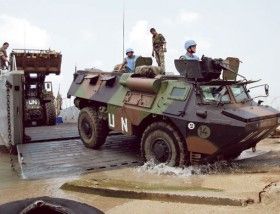Beirut: Lebanese President Emile Lahoud said yesterday that nations with military ties to Israel must not be part of the UN peacekeeping force that will police a truce along Lebanon-Israel border.
"All that we ask for is that the countries which will send troops must not have military agreements with Israel and that troops be equal in numbers so that no country's troops dominates the other," Lahoud said in comments distributed by his office.
"We want Unifil to be for all Lebanese, as is the Lebanese army and national resistance [Hezbollah]," he said.
Unifil is the UN Interim Force In Lebanon, the 2,000-member peacekeeping contingent which is to be expanded to a 15,000-strong force under the UN resolution that ended 33 days of fighting between Hezbollah fighters and Israeli forces on August 14.
It was not clear whether Lahoud's position was that of the government of Lebanon. He is a political rival of the parliamentary majority which backs Prime Minister Fouad Siniora.
In a report on Friday to the UN Security Council on implementation of the August 11 UN resolution calling for an end to the brutal Israeli-Hezbollah conflict, UN Secretary-General Kofi Annan appealed to member states to provide desperately needed peacekeepers.
A key concern of many countries is whether the UN force will be called on to disarm Hezbollah fighters, as called for in a September 2004 UN resolution. They want to study the rules of engagement and concept of operations for the force, which were distributed on Friday, before making a decision on troops.
Annan appealed to European countries on Friday to contribute troops to the expanded UN force to balance the commitments from Muslim countries so that both Israel and Lebanon will view it as legitimate.
French President Jacques Chirac spoke by telephone with the prime ministers of Italy, Turkey and Finland about the composition and future mandate of the expanded Unifil force, the Elysee presidential office said in a statement.
France had been expected to make a significant new contribution that would form the backbone of the expanded Unifil force. But Chirac disappointed the UN and other countries by contributing just 200 extra troops.
A Foreign Ministry spokesman said on Friday that France could always send extra troops at a later date, but Paris wants the force to have a clear mandate a position echoed by Italy, which has agreed to supply extra troops but has not specified how many.
Chirac discussed the composition and future mandate of the expanded Unifil force with Italian Prime Minister Romano Prodi, Turkish Prime Minister Recep Tayyip Erdogan and Finnish Prime Minister Matti Vanhanen, his office said in a statement.
"Regarding the composition of the reinforced Unifil, the president insisted on the essential balance of the distribution of contingents, which must reflect the involvement of the whole international community, and in particular of the European countries," it said.
He also stressed "the need to clarify very rapidly the missions, the rules of engagement, the chain of command and the means of the reinforced Unifil," the statement added.
Prodi has said Italy could quickly send as many as 3,000 soldiers. Finland formally decided to send up to 250 peacekeepers to Lebanon, but said they would not be deployed until November. Turkey has indicated it will contribute troops but wants to study the operational plans for the force and the rules of engagement before making any decisions.
The United Nations has been seeking a balance of European and Muslim troops so that Israel and Lebanon will view the force as legitimate.













